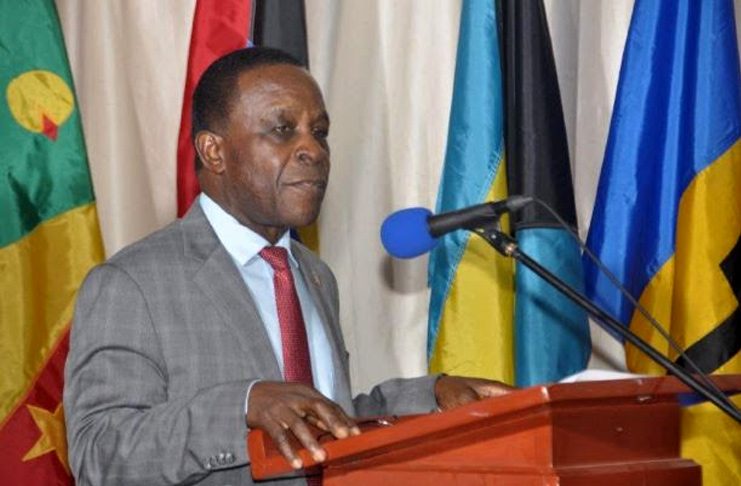At High Level Advocacy Forum on Statistics
Greater investment in statistics, and the infusion of statistics in schools to help to demystify the science and attract younger minds, were among the rallying calls at the Third High Level Advocacy Forum on Statistics.
The Forum was held Friday 22 February 2019, at the Grenada Trade Centre in St. George’s under the theme ‘Investing in Statistics to Build Resilience and to Achieve Sustainable Economic Growth and Development in the Caribbean Community’. It followed a one-day High Level Seminar on 21 February, also at the Grenada Trade Centre. The implementation of the Regional Strategy for the Development of Statistics (RSDS) to build resilience and generate evidence-based policy decisions was at the core of both events.
The Forum and Seminar were organised by the CARICOM Secretariat and the Central Statistics Office in Grenada with support from PARIS21, the Inter-American Development Bank (IDB) and the European Development Fund Support Services Unit, Grenada.
Dr. the Rt. Hon. Keith Mitchell, Prime Minister of Grenada, himself a statistician, led the charge on Friday in his keynote address, pointing out that statistics were a vital tool for governance and improving lives. At the core of building resilience, he said, were timely and high quality statistics. He underlined the importance of statistics across sectors, and singled out agriculture, trade, health, tourism and sports. He referenced the current success of the West Indies cricket team as a practical example of data collection and data analysis in action we are witnessing England/West Indies series of matches and you know how far we have gone with data collection and analyzing the data.
“You’ve heard the commentators over and over speak to how bowlers attack a certain batsman because they do research on how many times that batsman gets out with a specific ball and what type of bowler that he has a certain weakness for and therefore they tend to attack that person in that particular context. Similarly, batsmen get to understand, through data collection … the strengths and weakness of certain bowlers.
“So we’re not talking about something that is far removed because historically when we talk about these areas, we think of the intellectual and academic environments and not necessarily the practical. So it is extremely practical for us to invest in the area of statistics,” he said.
Long way to go
He said that while the Region had made strides in statistics, there was still “a very long way to go”. The Grenada Prime Minister held the view that the development of statistics had not been given the kind of attention that it deserved in the Region.
“We could do a lot more. I strongly believe that regional economies could have been far more advanced in terms of sustainable development had we adequately invested in our statistical systems to obtain data required for more effective decision-making,” PM Mitchell said.
In video messages to the opening, representatives of international development partners also weighed in on the matter of investment in statistics.
Message by ECOSOC President, H.E. Rhonda King to HLAF on Statistics
President of the UN Economic and Social Council, Her Excellency I. Rhonda King, said that more and better financing for data and statistics was needed and called on Member States to invest in their national statistics offices to strengthen their capacity to produce timely, high quality, relevant and dis-aggregated statistical evidence. She pointed to a recent study which called for the doubling of official development assistance for the sector.
PARIS21 Manager, Johannes Jutting, called on governments to “step in and ensure that funding is available for statistical operations”. Investment was also necessary for statistical literacy among the Region’s populace is data was to be used effectively.
Message by Johannes Jutting to HLAF on Statistics
“By understanding the meaning of numbers, statistical concepts, tables and graphs, citizens will be able to make more appropriate use of the information and be more capable of using evidence to make informed decisions,” he said.
His was a position that resonated with PM Mitchell who told delegates that investment in training was critical, especially in the context of staffing and resource constraints in his country and in the Region. This leads to inability to produce enough data to inform the development agenda.
“In other words, just as we train doctors… we train engineers; in our countries the scholarships are directed in specific areas of development, but I don’t think we have zeroed in on statistics in the same particular context. So it seems that we have to apply that same formula to statistics so that the young people coming up would know that there are specific scholarships available in this particular area of the science. So that is something that I think that we have somewhere to go and clearly should be one of the conclusions coming out” of the Forum, the Prime Minister said.
During the interactive sessions that followed the opening ceremony, Mr. Abraham Andall, President of the Grenada Chamber of Industry and Commerce also spoke of the need for the infusion of statistics in the school system. He advocated for more than simply basic competence in data protection, usage, and manipulation as a requirement for graduation at the level of national colleges. Prior to graduating, a student must show proficiency in a “project of some kind on accessing, using and presenting data”.
Meanwhile, in her video message to the Forum, Ms. Fekitamoeloa Katoa Utoikamanu, High Representative for the Least Developed Countries, Landlocked Developing Countries and Small Island Developing States acknowledged that the funding commitments to Small Island Developing States remained low, and advised that domestic and external funding needed to be boosted.
Message by Ms. Fekitamoeloa Katoa ‘Utoikamanu, at HLAF on Statistics 22 February, 2019
“This is critical so that funds for key statistical activities such as surveys to improve the information base about a country’s development can be undertaken in a timely way,” she said.
She urged governments in the Region to develop their statistical systems and elevate the status of statistical offices to ensure that National Statistics Offices (NSOs) could effectively support governments, the private sector and civil society in development activities.





